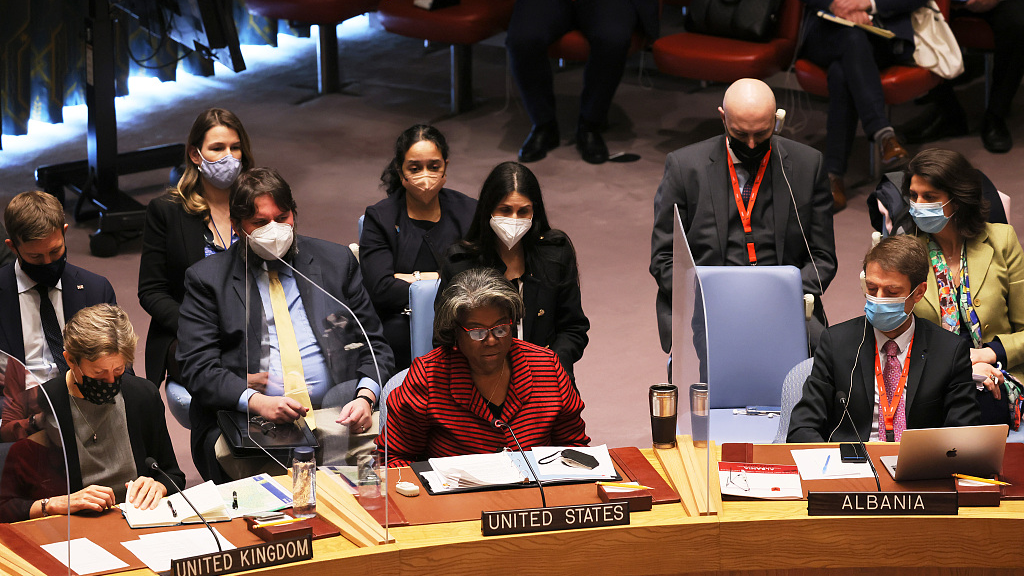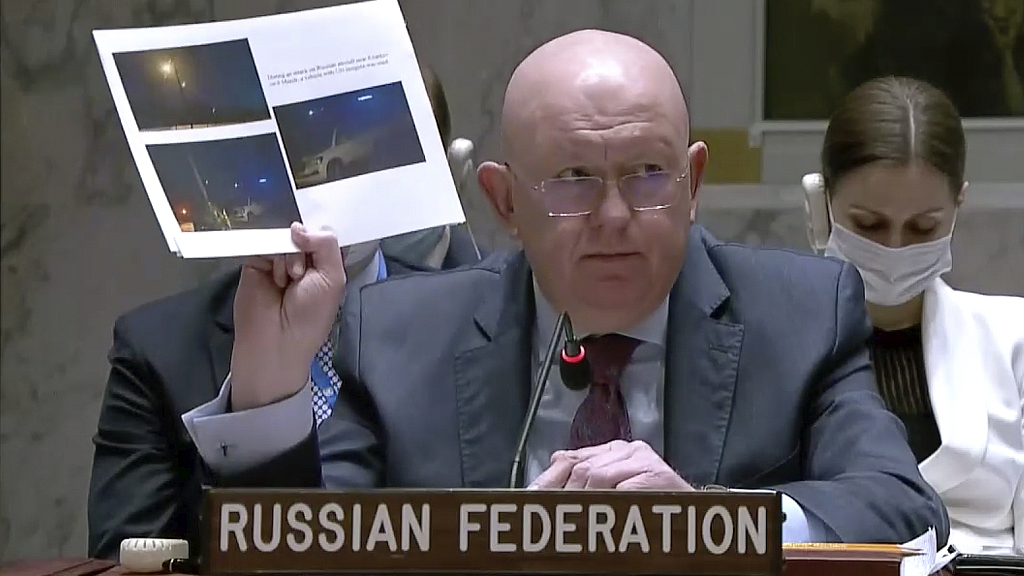
Members of the United Nations Security Council listen as Linda Thomas-Greenfield, United States Ambassador to the United Nations speaks during the UNSC meeting discussing the Russian and Ukraine conflict at the United Nations Headquarters in New York City, March 11, 2022. /VCG
Members of the United Nations Security Council listen as Linda Thomas-Greenfield, United States Ambassador to the United Nations speaks during the UNSC meeting discussing the Russian and Ukraine conflict at the United Nations Headquarters in New York City, March 11, 2022. /VCG
Editor's note: Anthony Moretti is an associate professor at the Department of Communication and Organizational Leadership at Robert Morris University. The article reflects the author's opinions and not necessarily those of CGTN.
Our story begins on February 5, 2003. On that date, then U.S. Secretary of State Colin Powell told the United Nations Security Council there was ample evidence to prove Iraq possessed weapons of mass destruction (WMDs). He urged the UN to act before it was too late in responding to what Saddam Hussein might do with those WMDs.
Our story continues on January 18, 2021. On that date and roughly one year into the coronavirus pandemic, the U.S. State Department claimed scientists inside the Wuhan Institute of Virology lab had begun experiencing COVID symptoms weeks before the Chinese government had alerted the world to a virus that would continue to kill into 2022. China's "deadly obsession with secrecy and control" guaranteed that the Chinese government had to be hiding something about the institute, according to the U.S. State Department.
The thread holding these two U.S. claims together: They are not true.
Our story now moves to March 8, 2022. Victoria Nuland is an undersecretary of state for political affairs. She set off a tempest, most especially in Russia, on that date when she answered a question posed by U.S. Senator Marco Rubio.
Rubio wanted to know whether there were biological or chemical weapons in Ukraine. Nuland's reply: "Ukraine has biological research facilities, which, in fact, we are now quite concerned Russian troops, Russian forces, may be seeking to gain control of. So, we are working with the Ukrainians on how they can prevent any of those research materials from falling into the hands of Russian forces should they approach."
The U.S. position about Ukraine and biological weapons can be summarized this way: Yes, Ukraine has facilities, which are funded by the U.S., for the purpose of studying pathogens that could cause health problems all over the world. However, those facilities do not produce anything akin to biological or chemical weapons.

Russian Ambassador to the United Nations Vasily Nebenzya holds up copies of photos while speaking during a Security Council meeting at UN headquarters in New York City, March 11, 2022. /VCG
Russian Ambassador to the United Nations Vasily Nebenzya holds up copies of photos while speaking during a Security Council meeting at UN headquarters in New York City, March 11, 2022. /VCG
Nuland and her colleagues at the State Department might very well be telling the truth when they say the only thing the U.S. fears is that viruses used in researching public health could be unleashed for a different and ominous purpose. Unfortunately, whether it is U.S. President Joe Biden, his primary spokesperson Jen Psaki, or Nuland, the U.S. is weighed down by their predecessors' lies about Iraq and China as it attempts to convince the world that it is an honest broker right now on the global stage.
The damage done to U.S. credibility across the world because of the lies about Iraq and China ensure a dark cloud continues to hang over Washington. Put rather bluntly: In multiple world capitals, Nuland is considered little more than another spinmeister, ever willing to contort a narrative that might strangle the truth in an effort to tell a story that advances America's interests.
And that takes us back to Iraq and 2003, and China and 2021.
Remember, Powell went before the UN in February 2003 to deliver a terrible lie. Let's set aside the fact that the UN voted that day not to authorize a second resolution supporting a military response against Iraq, which the U.S. was demanding, because another story developed on that tragic day that would not become obvious until years later. That story? The damage done to U.S. credibility at the UN because of its lies.
And what about the lies over Wuhan? Last July, I wrote an article for CGTN that called into question what evidence the U.S. was using to make the case that scientists inside the Wuhan Institute of Virology were becoming ill throughout the latter part of 2019. I noted an Australian scientist who had been working in that very lab in 2019 told Bloomberg News she never encountered anyone who was ill.
Danielle Anderson, the only foreign scientist who worked in the Wuhan Institute of Virology's BSL-4 lab in 2019, said, "If people were sick, I assume that I would have been sick – and I wasn't."
In my editorial, I added, "Dr Anderson left China in late 2019 once a grant associated with her work had come to an end. But only weeks later, at an important scientific gathering, she said not one person in attendance had heard of any Chinese scientists being ill. 'Scientists are gossipy and excited,' Dr Anderson told Bloomberg. 'There was nothing strange from my point of view going on at that point.'"
To wrap up our story, we must now examine what unfolded on March 11. On that date, Russian and U.S. officials delivered nasty rhetorical blasts at each other during a UN hearing on whether biological weapons do exist in Ukraine.
Russia's ambassador to the UN spoke of fears of "an uncontrolled spread of bio agents from Ukraine." His American counterpart Linda Thomas-Greenfield said the "intent behind these [Russian] lies" was clear: Moscow was trying to set the stage for potentially using its own chemical weapons "for assassinations as part of a false flag incident or to support tactical military operations."
Is Linda Thomas-Greenfield telling the truth? Before you answer, history would like you to remember 2003 and 2021.
(If you want to contribute and have specific expertise, please contact us at opinions@cgtn.com. Follow @thouse_opinions on Twitter to discover the latest commentaries in the CGTN Opinion Section.)

